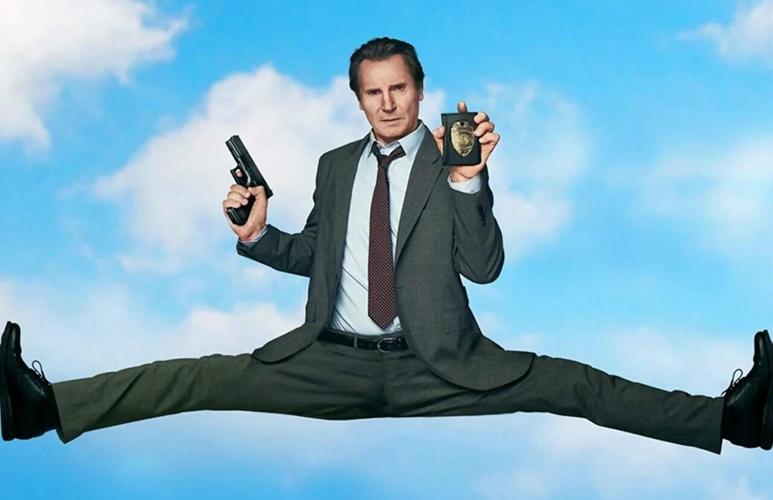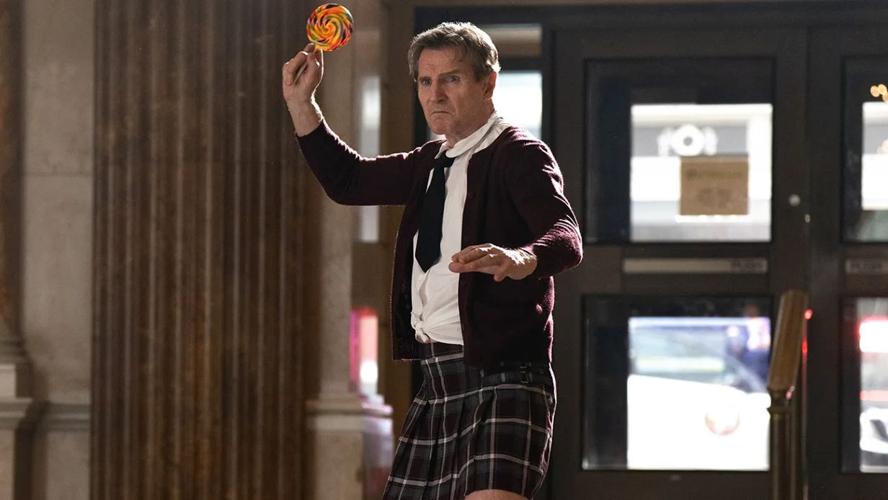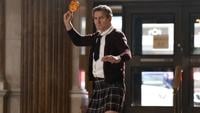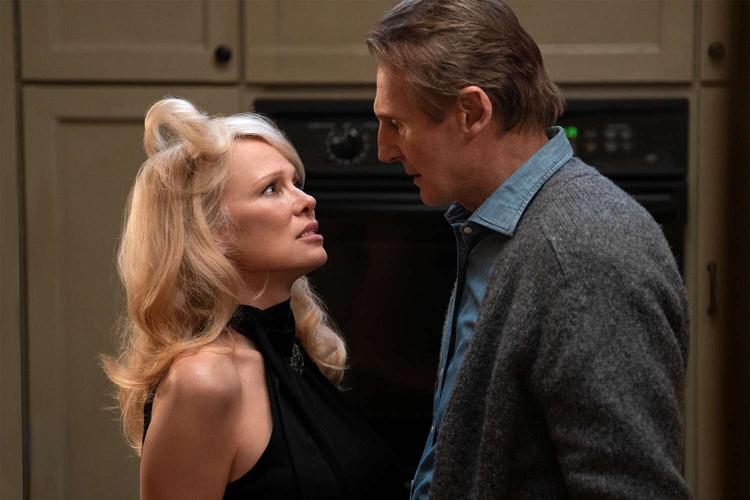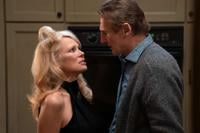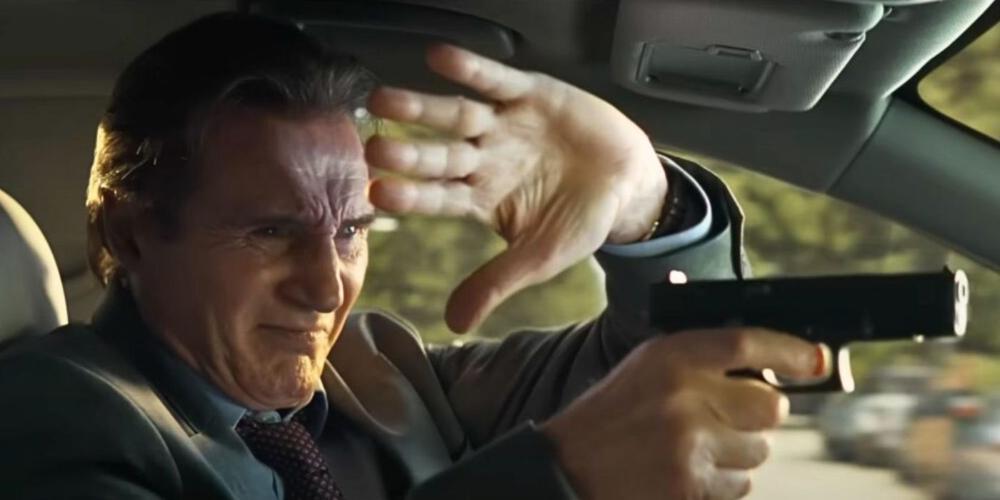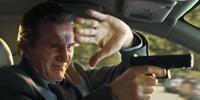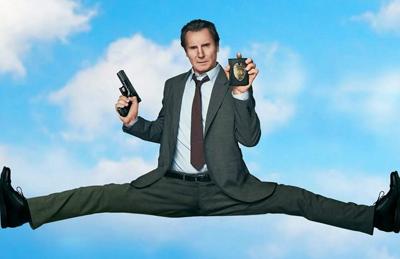The original, comedy film in 1988 opened with an American beating up a bunch of Middle Eastern leaders who were simply deemed terrorists, including a spoof of Yasser Arafat, the former Palestinian president. Given the current state of affairs between Israel and Palestine, doing a spoof of the Palestinians or anything regarding that conflict would be tricky. With all the conversations about the state of comedy and what can or can't be the subject of humor, I was curious as to how far this film would push things. The opening of that 1988 Zucker brothers hit included a shot of a cop car bursting into a women's shower and nude women being exposed, and it does beg the question of what kind of jokes would or would not be funny in today's culture. Given that we're now in the wake of the Me Too movement and that we're also in the wake of transgender women in sports, and this argument of not allowing men in women's spaces like bathrooms or showers, it's a wonder if this film, directed and co-written by Akiva Schaffer (Saturday Night Live), would go there in terms of the content it would tackle. South Park (1997) premiered its 27th season a couple of weeks prior and its creators, Trey Parker and Matt Stone, prove that nothing is off limits. Unfortunately, Schaffer doesn't have the temerity of Parker and Stone. Yet, even if he did, the culture has changed and things aren't viewed the same.
One prime example of how Schaffer doesn't have the temerity of Parker and Stone is that in the premiere episode of the 27th season of South Park, there is a moment where we see full-frontal nudity. Parker and Stone show us an animated penis. Here, there are multiple opportunities where Schaffer could have done the same, but yet he "cops out." In one scene there's some polka dot underwear covering a man's exposed nether region and in another scene there's a blurred effect. Comedies like Nicholas Stoller's Forgetting Sarah Marshall (2008) and the Farrelly brothers' Hall Pass (2011) didn't shy away from full-frontal nudity. Those films were rated R, whereas this film is PG-13, which is keeping in tradition with the 1988 entry. As such, one shouldn't expect much more than pratfalls, puns and an over-use of double entendres.

Liam Neeson (Taken and Batman Begins) stars as Frank Drebin, Jr., the son of the main character in the 1988 film. He's also a detective in Police Squad, a law enforcement organization in Los Angeles. He's a cop who doesn't play by the rules. He'll do whatever he has to do to stop bad guys. He has a very old-school way of thinking when it comes to masculinity, and how men are supposed to be. Namely, he thinks that men are supposed to be aggressive and violent if they have to be. A lot of the humor comes from Frank being excessively violent, which isn't good, considering that he's a police officer. In fact, he's constantly being reprimanded by his boss for his aggressive and violent behavior with which he sees no problem. It's only until he meets the villain of this film who mirrors his toxic masculinity back to him that Frank starts to realize that his form of violence isn't okay.
Until then, a lot of the jokes are about Frank's violence. The film of course leans into the fact that Neeson has became an action star since he's entered his 50's. Now, at the age of 70, he's still doing them. This is perhaps where my personal views and the culture clash with this film's depictions. The Black Lives Matter movement, or BLM which began in the summer of 2013, has changed the culture in a lot of ways. The George Floyd murder, which was a high-profile and egregious BLM case, caused massive amounts of protests in 2020. That case and those protests also changed, if not highly affected the culture. That change included how the police are perceived and even how they're portrayed in media. There's also been a shift in the portrayal of machismo and masculinity in regards to men in such positions of power, particularly white men. Arguably, for African Americans, that perception isn't new or all that different from what African Americans have always perceived, but, in the wake of Floyd's murder by a white male cop, that perception started to be shared by others in the mainstream and resulted in a more critical and more skeptical look at police. It could be said that the 1988 film and its sequels are similarly critical in that they're spoofing police procedural programs, but those spoofs always end with the police as the heroes to one degree or another.

The protagonist in the 1988 film was no better or equivalent to the 1940's animated character of Mr. Magoo, which is ironic because Leslie Nielsen who starred in the 1988 film also starred in Mr. Magoo (1997). Nielsen's character in both films was basically that of a bumbling fool. There are flashes where he's shown to be incredibly competent, but most time he's the king of pratfalls and probably the clumsiest person next to one or two others. However, it's usually the case that he luckily succeeds in whatever case he's trying to solve or bad guy he's trying to stop. That could be considered a critical spoof of the police, as it's in a way highlighting the police's incompetence.
I wasn't as convinced that that was the same with what this film was highlighting. Yes, we see Frank doing humiliating things, but it's not anything specific to him being a police officer. We get that Frank isn't the brightest bulb and the introduction of Beth Davenport, played by Pamela Anderson (The Last Showgirl and Baywatch), shows just as in the first with Priscilla Presley that Frank needed help from a woman in order to solve the case ultimately. Yet, when it comes to Frank's violent streak and his ability to fight and take down so-called bad guys, he needs no help and is always fully competent. When it comes to BLM cases, they usually involve cops shooting unarmed Black men. This film makes a joke about how Frank does shoot unarmed Black people and how often he does it that he can't even remember his victims. This could have been an effective joke, if Frank received any real repercussions for it. Basically, he gets to shoot unarmed Black men and have numerous BLM cases attached to him and nothing is done about it.

Later, there's a gag about Frank doing something illegal in order to coerce a confession. In that gag, he's supposedly arrested by Internal Affairs and it seems as if Frank might receive some consequences for his actions, but the ultimate gag is that Internal Affairs is somehow corrupt too. Yet, in the scene, Internal Affairs was simply mimicking what Frank was doing, so if they are meant to suffer some consequences, then Frank should as well. Yet, he doesn't. That is what ultimately left a bad taste in my mouth.
Rated PG-13 for crude/sexual material, violence, bloody images and brief partial nudity.
Running Time: 1 hr. and 25 mins.
In theaters.

